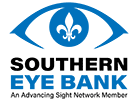FAQ Collapse Test
▸ What is an Eye Bank?
An eye bank is a non-profit organization that obtains, medically evaluates and distributes eye donations for the use of corneal transplant, research and education.
▸ What is the cornea?
The cornea is the clear, dome-shaped surface at the front of the eye. It is the main focusing mechanism of the eye.
▸ What is corneal blindness?
Corneal blindness is a visual impairment that is caused when the cornea becomes clouded, scarred, or misshapen. This condition may be the result of injury, infection or disease.
▸ What is the corneal transplant?
The transplant is a surgical procedure which replaces a diseased or non-functional cornea with a new, healthy donor cornea.
▸ Is the whole eye transplanted?
No, only the cornea is transplanted; however, sections of sclera (the white, fibrous shell of the eye), can be used to reconstructive surgeries, glaucoma patches and other surgical purposes
▸ How common is the corneal transplant?
The corneal transplant is the oldest, most successful and most common human transplant procedures performed. In the United States alone, over 60,000 people receive corneal transplants in a year.
▸ How successful is the corneal transplant?
Over 95% of all corneal transplant procedures restore the corneal recipient’s vision.
▸ Why should someone want to donate their eyes?
There is no substitute for human tissue. The transplantation process depends upon the priceless gift of corneal donation. Eyes are needed for transplantation as well as for research and education. Without corneal donors, those in need would not receive the gift of sight.
▸ Who can be an eye donor?
Anyone can be an eye donor. Cataracts, poor eye sight, and other similar conditions would not prohibit you from being an eye donor. It is important for individuals wanting to be donors to inform their family members of their wishes.
▸ If a person has signed a donor card or a driver’s license, how can they be sure that their wishes regarding donation will be carried out?
Tell your family you want to be an eye donor. Next of kin consent is required for donation, so it is helpful if your family knows ahead of time how you feel about it.
▸ How great is the need for corneas?
Although more than 60,000 corneal transplants were performed in North America last year, the need for corneal tissue is never satisfied.
▸ Will the quality of medical treatment be affected if one is a donor?
Strict laws protect the potential donor. The attending physician involved would not be involved with the donation process. It is only after the donor’s death will the family be asked to donate their loved one’s eyes.
▸ Will the family of the donor know who received their loved one’s corneas?
The gift of sight is made anonymously. Identifying information about the donor or donor’s family is not available to the recipient. If the donor’s family or recipient wishes to send correspondence, the eye bank will convey the messages with permission from the receiving party.
▸ Are there religious objections to eye donation?
No. Donation is an opportunity to help save a life or restore someone’s sight. As such, eye, organ and tissue donation is consistent with the beliefs of all major religions.
▸ For more information about organ, eye, and tissue donation...
please visit Donate Life Louisiana at https://donatelifela.org/
▸ For more information about eye banking in the United States...
please visit The Eye Bank Association of America at http://restoresight.org/


